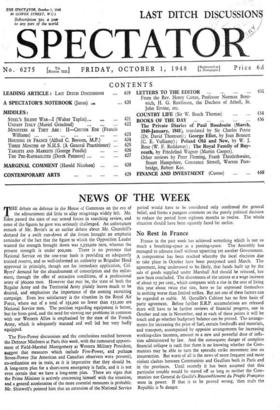No Rest in France
France in the past week has achieved something which is not so much a breathing-space as a panting-space. They Assembly has managed to adjourn itself without upsetting yet another Government. A compromise has been reached whereby the local elections due to take place in October have been postponed until March. The agreement, long understood to be likely, that funds built up by the sale of goods supplied under Marshall Aid should be released, has now been concluded. The discontents of the unions at a wage increase of about 15 per cent., which compares with a rise in the cost of living this year about twice that size, have so far expressed themselves in nothing worse than limited strikes. But not one of these factors can be regarded as stable. M. Queuille's Cabinet has no firm basis of party agreement. Before further E.R.P. accumulations are released there will have to be further reviews of financial progress, one in October and one in November, and at each of these points it will be touch and go whether budgetary balance can be proved. The arrange- ments for increasing the price of fuel, certain foodstuffs and materials, and transport, accompanied by opposite arrangements for increasing working-class incomes, amount to a new and powerful dose of infla- tion administered by law. And the consequent danger of complete financial collapse is such that there is no knowing whether the Com- munists may be able to turn the sporadic strike movement into an insurrection. But worst of all is the news of more frequent and more violent clashes between Communists and Gaullists both in Paris and in the provinces. Until recently it has been assumed that this particular trouble would be staved off so long as neither the Com- munists nor General de Gaulle's Rassemblement du Peuple Frangaise were in power. If that is to be proved wrong, then truly the Republic is fn danger.


































